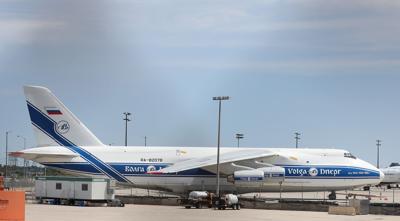Prime Minister Mark Carney’s Cabinet is barely appointed — but it already needs to make a history-making decision.
As G7 host this week, will Canada push to save Ukraine, defend Canada’s national security, and strengthen both international law and Canada’s international credibility? Or will it be complicit in an unprecedented bailout of Russia, an imperialist regime intent not simply on destroying Ukraine as a sovereign state — but on testing NATO from the Baltic countries to Canada’s Arctic?
With one key date staring back at us — July 31²õ³ÙÌý— we face this stark choice.
That’s when Europe must vote unanimously to extend Russian sanctions, including a freeze on $300 billion in frozen Russian central bank reserves, . If Russia-leaning Hungary or Slovakia feel emboldened by Donald Trump’s recent dovish turn and veto an extension, hundreds of billions will go straight back to Russia — including Canada’s share.
Such an event would see more money sent back to Russia in Canadian funds than Canada has given to Ukraine since 2022.
Our conviction that Canada must help stop Putin’s bailout led us both to sign an with over 70 other signatories. In it, we warn there’s no ducking this decision or kicking it down the road. The choice is no longer whether to keep the assets frozen or seize them. The choice is for Ukraine’s Western allies to immediately confiscate the funds and transfer them to a compensation fund for Ukraine, or send them back to Russia. There is no middle ground anymore.
The multi-partisan and international signatory list, including former Prime Ministers Stephen Harper, Boris Johnson, Rishi Sunak, and a host of other former Cabinet ministers — both Conservative and Liberal — only highlight how urgent this policy measure is.
As dire as the alternative is, transferring Russia’s state assets to support Ukraine offers Prime Minister Carney the opportunity to be an immediate international statesman.
No other country is better placed politically to lead. Canada is the current G7 host. Over 80 pe rcent of Canadians . Both the Conservatives and Liberals announced their support for transferring the frozen assets during the election campaign. At a time of sometimes polarising divisions, this offers a chance for the Prime Minister to be a unifier, enhancing Canadian international credibility after years of failed Security Council bids and some of the lowest defence spending in NATO.
Many of Canada’s G7 partners will also welcome Canadian leadership, which can give them the push they need at the right time. The recent German coalition agreement references the incoming government’s support for using Russia’s frozen assets to support Ukraine militarily and financially. UK Parliament passed a motion in January stating that it is the position of the British House of Commons that Russia’s frozen assets be seized. There are even signs that France, one of the major holdouts, may be open to shifting its position. With US leadership in doubt, we can demonstrate that a newly self-confident Canada is more than an election campaign device.
Seizing Russia’s frozen assets is not only legal, but is financially feasible, strategically sound, morally right, and popular among Canadians. It will strengthen international law by setting two important precedents. The first is that the right to human life and the obligation of states to uphold international peace and security ranks higher than the right for states to enjoy absolute protection of their property without accountability — no matter how else they might violate international law.
The second important precedent is that international law can be enforced. Legally, sovereign immunity would normally apply to Russia’s state assets — if it was upholding international law. But under the legal doctrine of countermeasures, Russia forfeits this immunity so long as it’s grossly violating international law.Â
Enforcing countermeasures allows us to send a message that we will take international law seriously. Failing to do so sends the message that we will uphold it only when it’s easy. But as any Canadian well-versed in our country’s history will tell you, Canada’s tradition is to do what is right internationally, even when it isn’t easy. Compared to the challenges this country has faced, the question of whether to support seizing Russia’s assets is simple.

































To join the conversation set a first and last name in your user profile.
Sign in or register for free to join the Conversation